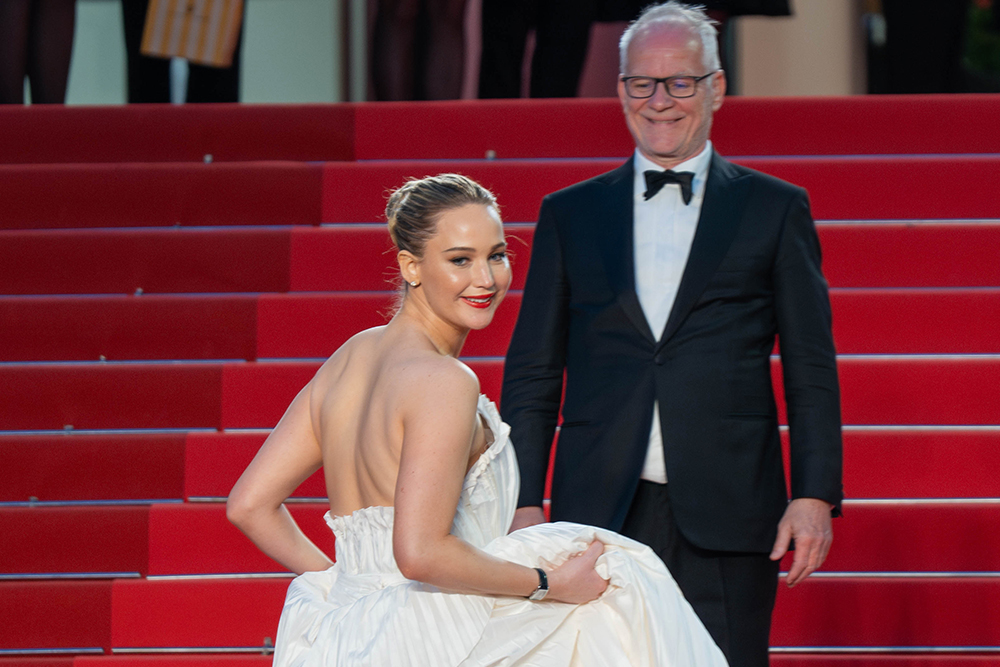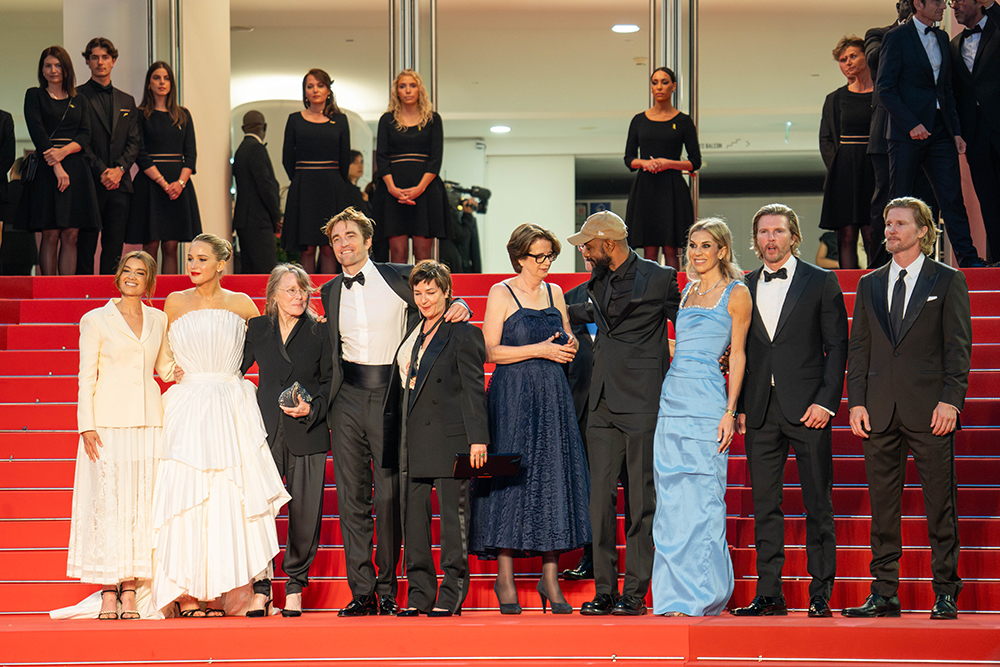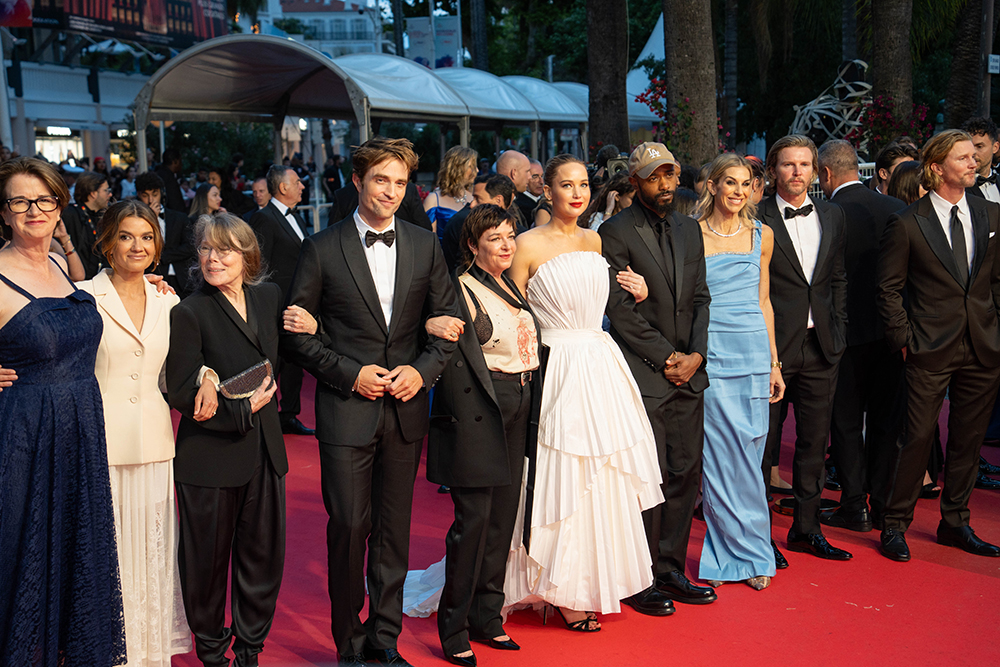Festivals - Cannes 2025 : Die, My Love Stuns the Croisette with Jennifer Lawrence’s Most Uncompromising Performance to Date
By Mulder, Cannes, Palais des Festivals et des Congrès de Cannes, 17 may 2025

Premiering in competition at the 2025 Cannes Film Festival on May 17, Die, My Love marked the long-awaited return of acclaimed Scottish filmmaker Lynne Ramsay and immediately established itself as one of the most divisive yet unshakable entries in this year’s official selection. Adapted from Ariana Harwicz’s 2017 novel Crève, mon amour, the film stars Jennifer Lawrence in a career-defining role alongside Robert Pattinson, Lakeith Stanfield, Sissy Spacek and Nick Nolte. Set in the remote Montana countryside, the story follows Grace, a young mother grappling with severe postpartum depression that quickly spirals into full-blown psychosis. Ramsay’s adaptation relocates Harwicz’s intense inner monologue-driven French novel to a raw, isolated American landscape, retaining its visceral emotional brutality while giving it new cultural resonance. The film was met with a six-minute standing ovation at its premiere in the Grand Théâtre Lumière, a testament to the power of its performances, direction, and willingness to confront difficult truths.
The project itself has an unexpected yet remarkably organic origin story. In 2020, legendary filmmaker Martin Scorsese read Harwicz’s novel in his personal book club and was so struck by its audacity and emotional force that he sent it to Jennifer Lawrence, suggesting it as a potential vehicle for her. Lawrence, drawn to the project’s unapologetic intensity, optioned the rights through her production company Excellent Cadaver and reached out to Ramsay, who immediately connected with the material. Ramsay brought on playwright Enda Walsh to write the initial draft of the script before taking over with co-writer Alice Birch, crafting a screenplay that would stay true to the novel’s stream-of-consciousness while reshaping it for the screen. Ramsay’s last feature, You Were Never Really Here (2017), also premiered at Cannes and earned her the Best Screenplay award. Die, My Love marks her first film in eight years and her third time in the main competition, following We Need to Talk About Kevin in 2011. Her longstanding connection with Cannes goes back even further, with her student short Small Deaths winning the Jury Prize in 1996.

The casting of Jennifer Lawrence as Grace is nothing short of a revelation. Known for carefully selecting roles in recent years and focusing more on producing than acting, Lawrence plunges into the role with a fearless abandon not seen since her controversial turn in Darren Aronofsky’s Mother!. However, in Die, My Love, her performance is less symbolic and more flesh-and-bone. Grace is not a cinematic metaphor—she is a woman tormented by the sheer weight of existence, and Lawrence makes her pain heartbreakingly tangible. Throughout the film, she oscillates between catatonic silence and animalistic rage, desperate for connection yet increasingly detached from reality. In one unforgettable early scene, she stares blankly at her crying infant before bursting into laughter, then tears. Lawrence reportedly declined the use of an intimacy coordinator, fully committing to the role’s physical and emotional demands. According to director Ramsay, Lawrence wanted to strip away all artifice, saying, “She was not interested in protecting herself—only in honoring the character’s truth.” It’s a performance that feels dangerous in the best way and places Lawrence firmly in the conversation for Best Actress, both at Cannes and beyond.
Robert Pattinson, playing Jackson, Grace’s increasingly distant husband, delivers a more subdued but equally important performance. He is not the film’s center, but rather its mirror—a man overwhelmed by his wife’s unraveling but unable or unwilling to confront it. Pattinson’s interpretation of Jackson is deliberately passive, sometimes to the point of frustration, which adds to the film’s tension. As Grace unravels, Jackson retreats further, becoming a symbol of the emotional negligence that can exacerbate mental illness. In one haunting sequence, he watches silently from across the room as Grace smashes plates and screams into the void, paralyzed by his own impotence. According to Pattinson, this role was one of his most challenging, not for its intensity but for its restraint. He revealed in interviews that he had to take dance classes for a particular scene Ramsay insisted on including—a moment of absurd levity amid the film’s darkness, which Ramsay has described as her “own kind of comedy.” That blend of bleak humor and emotional horror defines Die, My Love, and Pattinson’s performance, while understated, fits perfectly within Ramsay’s carefully constructed chaos.

Behind the camera, the film is visually arresting and deeply unsettling, thanks in large part to Ramsay’s longtime collaborator, cinematographer Seamus McGarvey. Shot on 35mm in the Academy ratio of 1.33:1, the visual language of Die, My Love evokes the claustrophobia of Roman Polanski’s Repulsion and Rosemary’s Baby, two of Ramsay’s acknowledged influences. Every frame feels constrained and suffocating, perfectly mirroring Grace’s deteriorating mental state. The house in which the couple resides becomes a character in itself—creaking, isolated, and oppressive. Editing by Toni Froschhammer is deliberately disorienting, employing sudden temporal ellipses and fragmented cuts that force the audience into Grace’s fractured perception of time and reality. The sound design is equally jarring, with sudden bursts of distorted music, ambient noises amplified to unsettling volumes, and a haunting original score developed in part by Ramsay and composer George Vjestica.
The supporting cast adds further texture to the film’s psychological terrain. Lakeith Stanfield plays a mysterious biker who becomes Grace’s lover and possibly a hallucination; his presence blurs the lines between desire and delusion. Sissy Spacek and Nick Nolte make brief but impactful appearances as Grace’s in-laws, providing a generational contrast that hints at cycles of inherited trauma. Their characters are never fully explained, yet their presence looms large, adding to the sense of isolation and disconnection that permeates the film. Though much of the narrative focus remains tightly on Grace, these supporting roles enhance the thematic depth and emotional stakes of her descent.

While most critics have praised Die, My Love for its boldness and stylistic ambition, reactions have not been universally positive. Variety criticized the film for indulging in “violent dysfunction” without adequately interrogating it, while acknowledging its visual and technical excellence. However, the majority of early reviews have lauded both Ramsay’s direction and Lawrence’s transformative performance. Deadline described the film as “mesmerizing” and predicted it could mark a turning point in Ramsay’s already celebrated career. The Guardian awarded it four stars, highlighting the “super-strength direction” and Lawrence’s portrayal of a woman torn apart by betrayal and bipolar disorder. IndieWire, always attentive to performances, declared Lawrence “goes full feral,” calling her turn “the kind of unleashed performance that festival Best Actress awards are made for.” That sentiment was echoed across social media and in press conferences, where Lawrence’s name was on everyone’s lips as a clear contender for Cannes honors.
Mubi, the global streaming platform and boutique distributor, acquired the film’s distribution rights shortly after the premiere in a landmark $24 million deal—their largest to date. The acquisition includes theatrical rights in North and Latin America, most of Europe, India, and Australia, with a guaranteed 45-day theatrical window on 1,500 screens in the U.S. alone. This bold move confirms the faith industry insiders have in the film’s commercial and awards potential despite its challenging subject matter. It also cements Mubi’s growing reputation as a serious player in the independent film market, signaling that they believe Die, My Love can break out beyond the arthouse circuit and reach a wider audience.

What makes Die, My Love truly stand out is its unflinching portrayal of a condition rarely addressed with such honesty in cinema. Postpartum depression remains a stigmatized and underrepresented experience, and Ramsay, through her razor-sharp lens and Lawrence’s devastating embodiment of Grace, brings it into the starkest possible focus. The film refuses easy answers or tidy resolutions. It is not a redemption story. It’s a portrait of suffering that asks the audience to witness, not to judge. In a cultural landscape where mental health is increasingly commodified into digestible narratives, Die, My Love stands apart for its refusal to sanitize or simplify. This is a film that dares to be brutal, and in doing so, becomes unforgettable.
As Cannes continues, the buzz around Die, My Love is only intensifying. Whether or not it takes home the Palme d’Or—or earns Jennifer Lawrence another Oscar nomination—it has already secured its place as one of the most talked-about and artistically daring films of 2025. And for Lynne Ramsay, it is a resounding affirmation of her place among cinema’s most vital and fearless auteurs.

You can discover our photos in our Flickr page
Synopsis :
In the French countryside, a woman battles her own demons.
Die, My Love
Directed by Lynne Ramsay
Written by Enda Walsh, Lynne Ramsay, Alice Birch
Based on Die, My Love by Ariana Harwicz
Produced by Martin Scorsese, Molly Smith, Trent Luckinbill, Thad Luckinbill, Jennifer Lawrence, Justine Ciarrocchi, Andrea Calderwood
Starring Jennifer Lawrence, Robert Pattinson, LaKeith Stanfield, Sissy Spacek, Nick Nolte
Cinematography : Seamus McGarvey
Edited by Toni Froschhammer
Production companies : Black Label Media, Excellent Cadaver, Sikelia Productions
Distributed by Mubi
Release date : May 17, 2025 (Cannes)
Running time : 118 minutes
Photos : @fannyrlphotography

